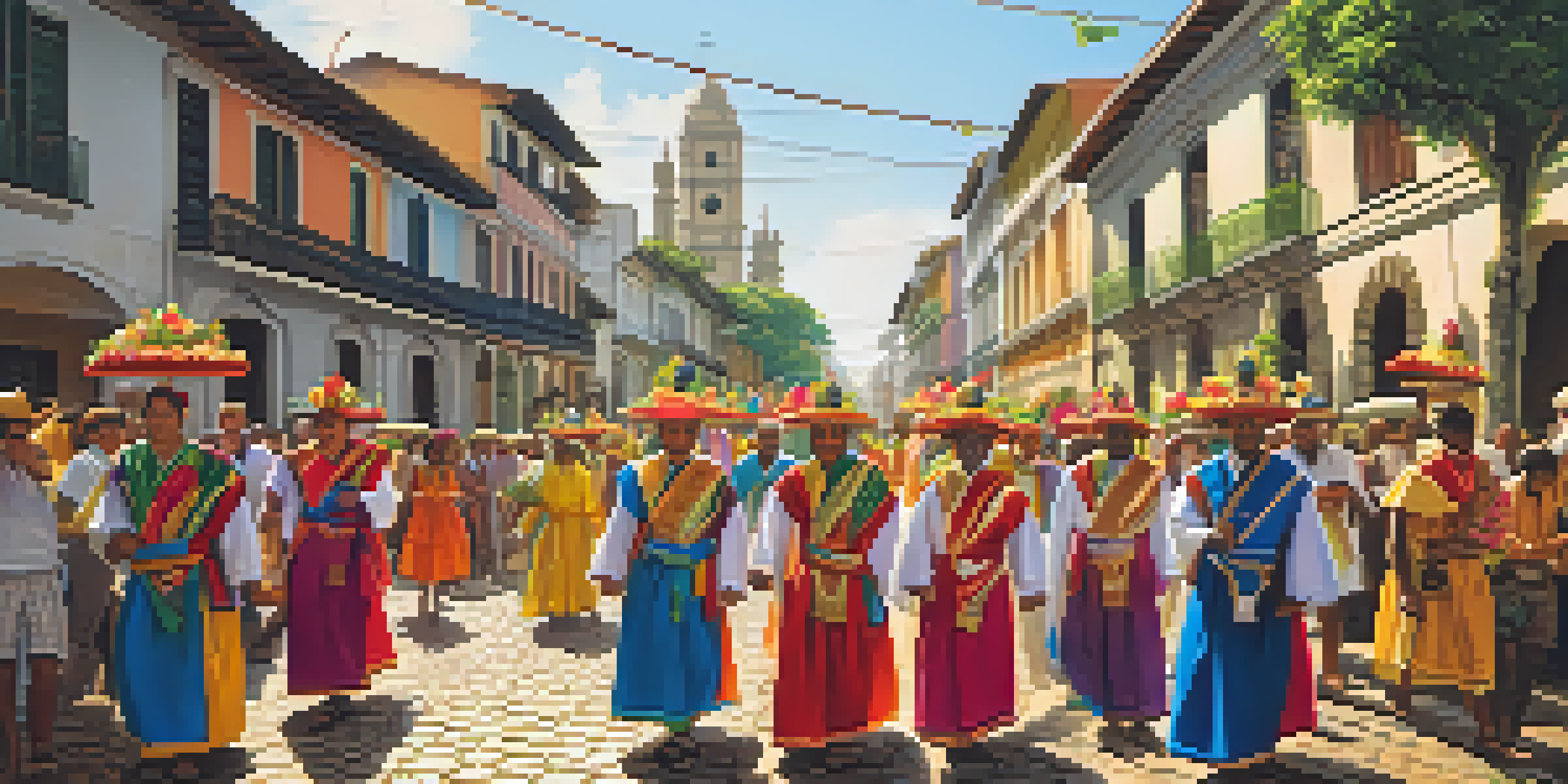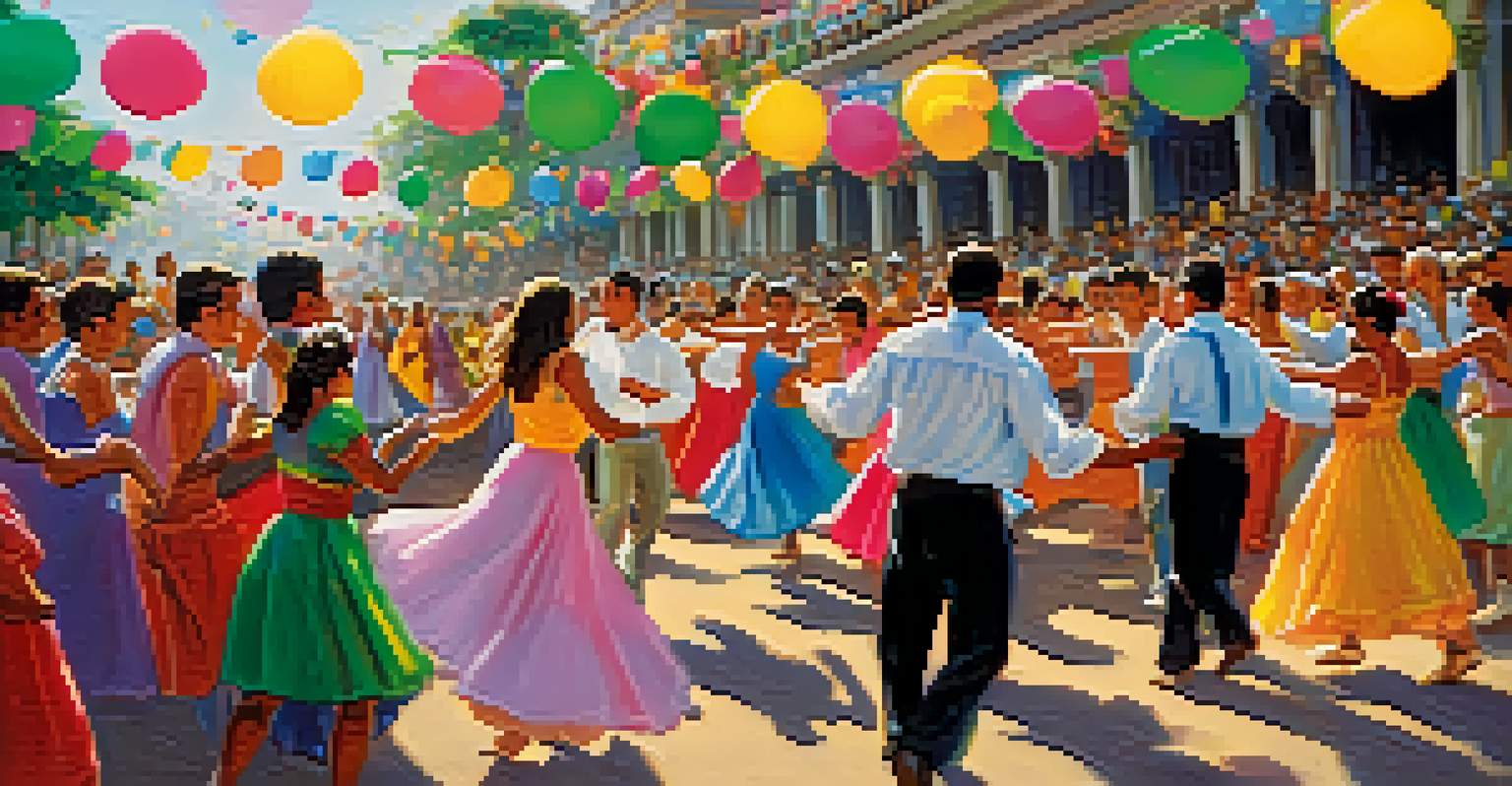Understanding the Importance of Easter in Brazil

The Historical Roots of Easter in Brazil
Easter in Brazil has deep historical roots, reflecting the country's colonial past. The introduction of Christianity by Portuguese colonizers in the 16th century laid the groundwork for Easter celebrations. Over the centuries, these traditions evolved, blending indigenous and African influences with European customs.
Easter is a time for reflection and renewal, a period to strengthen our faith and cherish our community.
As Brazil developed its unique identity, the celebration of Easter became a colorful tapestry of cultural expressions. For instance, many Brazilian cities host vibrant processions that echo the solemnity of religious observance, yet are infused with local flair. This blend of traditions showcases Brazil's diverse cultural landscape.
Understanding the history of Easter in Brazil helps us appreciate its evolution. It's not just a religious event; it's a celebration of heritage, community, and the vibrant spirit of the Brazilian people.
Religious Significance of Easter in Brazil
Easter is primarily a Christian holiday that commemorates the resurrection of Jesus Christ. In Brazil, it holds immense religious significance for millions of Catholics and Protestants alike. The week leading up to Easter, known as Holy Week, features various rituals and ceremonies that reflect deep faith and devotion.

Many Brazilians attend Mass on Easter Sunday, participating in communal prayers and hymns that resonate with hope and renewal. The somber atmosphere of Good Friday, marked by reflections on Jesus' crucifixion, transitions into the joyful celebrations of Easter Sunday. This shift symbolizes the triumph of life over death.
Easter Celebrates Cultural Diversity
Easter in Brazil is a vibrant blend of indigenous, African, and European traditions, showcasing the country's rich cultural tapestry.
For many families, Easter is a time to strengthen their faith and share meaningful traditions with loved ones. The intertwining of religious observance with familial bonds showcases the importance of community during this holy time.
Culinary Traditions Associated with Easter
Food plays a central role in Brazilian Easter celebrations, with various traditional dishes taking center stage. One of the most popular is 'bacalhau,' or salted cod, which is often served in numerous ways, reflecting regional variations. This dish has become synonymous with Easter, symbolizing both tradition and culinary heritage.
Food is not just about sustenance; it represents the sharing of love and joy with those around us.
Beyond bacalhau, sweets and desserts also hold importance during this season. Chocolate eggs, beautifully decorated and filled with surprises, are a beloved treat for both children and adults. The act of gifting and sharing these eggs fosters a sense of joy and togetherness among families.
Food during Easter is more than just sustenance; it represents the sharing of love and joy with those around us. Through these culinary traditions, Brazilians connect with their heritage while creating lasting memories.
Festivals and Processions Celebrating Easter
Across Brazil, Easter is marked by vibrant festivals and processions that bring communities together. In cities like Ouro Preto and Salvador, elaborate parades feature religious imagery and traditional music, creating a festive atmosphere. These events reflect Brazil's rich cultural diversity and artistic expression.
Many towns host reenactments of the Passion of Christ, a powerful way to engage the community in the story of Easter. These dramatizations often involve local residents, making the celebration a collective experience. The merging of faith and artistry captivates both participants and spectators alike.
Community and Faith Unite at Easter
The holiday fosters a sense of community, as families come together for religious observances and shared traditions.
Attending these festivals provides a unique opportunity to witness the spirit of Easter in Brazil firsthand. They serve as a reminder of the importance of community and shared faith, bringing people together in celebration and reflection.
The Role of Music and Dance in Easter Celebrations
Music and dance are integral to Easter celebrations in Brazil, infusing the festivities with energy and joy. Traditional songs, often accompanied by regional instruments, echo through the streets during processions, creating an uplifting atmosphere. This musicality reflects Brazil's rich cultural heritage and its love for rhythm.
In addition to traditional hymns, contemporary music also plays a role in modern Easter celebrations. Many communities incorporate popular songs into their festivities, appealing to younger generations and encouraging participation. This blend of old and new exemplifies the evolving nature of cultural expressions.
Dance is another vital element, as people come together to celebrate in rhythm and movement. Whether it's the graceful steps of a religious procession or the lively beat of a samba, dance fosters a sense of unity and joy among participants.
Easter as a Time for Reflection and Renewal
For many, Easter represents a time for personal reflection and spiritual renewal. It provides an opportunity to pause and consider one's faith, values, and relationships. The solemnity of Good Friday often invites introspection, leading to a deeper understanding of one's beliefs.
During this season, many Brazilians engage in practices such as confession and prayer, seeking to strengthen their connection to their faith. This journey inward is complemented by the outward expressions of joy and celebration on Easter Sunday, symbolizing rebirth and new beginnings.
Culinary Traditions Enhance Celebrations
Food plays a central role during Easter, with dishes like bacalhau and chocolate eggs symbolizing love, joy, and cultural heritage.
Ultimately, Easter is not just about rituals; it's about personal growth and the hope that comes with renewal. This duality of reflection and celebration resonates deeply within the hearts of many Brazilians.
The Impact of Easter on Brazilian Society
Easter celebrations in Brazil extend beyond personal faith to influence broader societal dynamics. They foster a sense of community and belonging, as people come together to honor traditions and support one another. This collective experience strengthens social bonds and nurtures a spirit of solidarity.
Moreover, the economic impact of Easter cannot be overlooked. The holiday season boosts local businesses, from bakeries selling special treats to artisans crafting festive decorations. This economic activity highlights the intertwining of culture and commerce, as communities celebrate while supporting local economies.

Ultimately, Easter serves as a reminder of the values that unite Brazilians—faith, community, and resilience. Its impact resonates not only during the holiday but also throughout the year, shaping the cultural fabric of Brazilian society.
Conclusion: The Enduring Spirit of Easter in Brazil
Easter in Brazil is a rich tapestry woven from history, faith, and cultural expression. The traditions observed during this season reflect the deep religious significance while also celebrating the diverse heritage of the Brazilian people. It's a time when communities come together, embracing shared values and vibrant festivities.
From culinary delights to lively processions, Easter fosters a sense of connection and joy. As families gather to celebrate, they create lasting memories that reinforce the importance of love, faith, and community. The spirit of Easter is alive in every corner of Brazil, showcasing its enduring relevance.
As we reflect on the significance of Easter in Brazil, it becomes clear that this celebration transcends mere observance. It embodies the essence of community, resilience, and hope, leaving a lasting impact on the hearts of those who partake in its rich traditions.